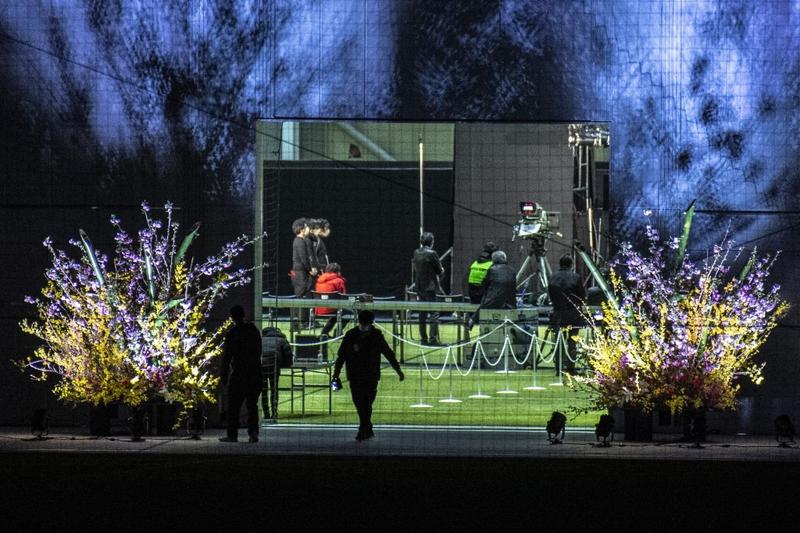 Personnel work at the All-Weather Training area, the venue of the grand start of the Tokyo 2020 Olympics torch relay, on the eve of the event at the J-Village in Naraha town, Fukushima Prefecture on March 24, 2021. (CHARLY TRIBALLEAU / AFP)
Personnel work at the All-Weather Training area, the venue of the grand start of the Tokyo 2020 Olympics torch relay, on the eve of the event at the J-Village in Naraha town, Fukushima Prefecture on March 24, 2021. (CHARLY TRIBALLEAU / AFP)
TOKYO - Japan’s government said on Thursday it will impose emergency measures, such as shorter business hours and asking people to work from home and refrain from activities like karaoke, in the western region of Osaka to halt a rebound in COVID-19 cases.
Osaka governor Hirofumi Yoshimura said Olympic torch events in the prefecture’s main city should be cancelled, a day after he raised alarm about an emerging fourth wave of infections.
The infection control measures will cover the prefectures of Osaka, Hyogo, and Miyagi and will last from April 5 until May 5, said Economy Minister Yasutoshi Nishimura, who also heads the nation’s COVID-19 response.
The infection control measures will cover the prefectures of Osaka, Hyogo, and Miyagi and will last from April 5 until May 5, said Economy Minister Yasutoshi Nishimura, who also heads the nation’s COVID-19 response
A final decision on enacting the measures will be made at a task force meeting headed by Prime Minister Yoshihide Suga this afternoon.
New infections in Osaka have exceeded those of the much larger metropolis of Tokyo in recent days.
Osaka prefecture reported 599 new cases on Wednesday, close to the record of 654 in early January when the nation was gripped in its third and most deadly wave of the pandemic. Tokyo reported 475 new infections today (April 1), the most since Feb 10.
ALSO READ: Experts fear Olympics could trigger global spreader event
The new measures are based on a revised infection control law and can be applied to a narrower area than a state of emergency, which Suga declared for most of the country in early January.
The controls allow regional governments to order businesses to shorten hours and to impose fines of 200,000 yen (US$1,806.52) or publish the names of those that do not comply. Additionally, residents are being asked to telework and to refrain from activities like karaoke.
Osaka emerged early from the state of emergency, but then experienced a sharp rebound in cases toward the end of March.
“In Osaka in particular, the number of infected individuals in their 20 and 30 is increasing as people continue to go out at night,” Chief Cabinet Secretary Katsunobu Kato said on Thursday. “Reports of mutant strains are also increasing, and the contagion is expected to continue.”
ALSO READ: Overseas athletes may be able to take part in Olympic test events
The torch relay for the Tokyo Olympics is scheduled to go through Osaka prefecture from April 13-14.
“I think we need to have talks with the city of Osaka, but personally I think the torch relay in Osaka city should be cancelled,” Yoshimura told reporters, adding that he also wanted to have discussions with the Tokyo 2020 Olympics organizing committee.
Tokyo 2020 did not immediately respond to a request for comment.
The relay began last week in Fukushima and is being seen as the first major test of the Games in holding a large-scale event while implementing stringent health protocols.
Around 10,000 runners will carry the torch through the country’s 47 prefectures over 121 days.
READ MORE: Veteran Chen Dongqi to make Olympic debut at Tokyo 2020
Tokyo Olympics organizers are requiring roadside spectators to wear masks, practice social distancing and not cheer out loud to prevent the spread of the virus, and there have been no reports so far of infections arising from the relay.
Nagano prefecture barred spectators from parts of the relay on Thursday, however, in a move aimed at preventing large groups from gathering after its capital city raised its COVID-19 alert level following a recent rise in infections.
No spectators will be present when the last relay runner of the day brings in the torch and lights the Olympic cauldron in Nagano City, the prefecture said.
Spectators will also be barred from a section of road in Nagano City that was expected to attract large numbers of people, while the city’s elderly and those with underlying conditions were urged to avoid watching from roadsides.
Although Japan has been affected by the pandemic less severely than the United States and Europe, its vaccination campaign is off to a slow start while some prefectures are seeing an uptick in new infections.
Most Japanese oppose holding the Games this summer during the pandemic, surveys have shown. Olympic organizers last month decided to bar international spectators from the Games, and this month are due to decide on the maximum capacity for spectators in venues.
The Olympics, postponed by a year because of the pandemic, are scheduled for July 23 to Aug 8 and the Paralympics from Aug 24 to Sept 5.


